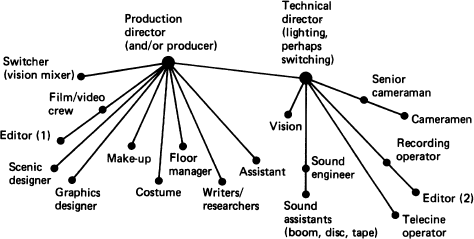Staffing and Responsibilities
Clearly, manning arrangements depend on the resource and its frequency of use. It is important to realise that a multiplicity of skills come together in the making of professional programmes and some training in all these skills is vital for the staff involved. In some applications the hire of freelance staff and/or facilities may be the solution.
Where a regular use of the facility is planned, dedicated engineering staff to look after and maintain the equipment are essential even though this can sometimes be minimised if it is possible to come to servicing agreements with manufacturers or servicing agencies. For operational staff, look for people with proper basic training as well as enthusiasm and creative ability. In small installations the concept of the operational engineer, a person who can combine engineering expertise with operational skills, is efficient and fulfilling but such people are quite rare. Flair and creativity are talents not easily acquired, but when coupled with training and experience, can produce the ideal member of a production team.
Small installations often employ staff with a range of skills rather than a single discipline but considerable attention to training is required to develop skills in a range of activities in which the person has an aptitude. Regular practice of those skills will also be required and attention to nurturing the skills can pay dividends in job satisfaction and cost effectiveness.
Staff members
Working on location with a single camera utilises fewer people but needs good rapport and the ability to work closely together as a team, sometimes for long periods in adverse conditions.
Studios are controlled environments generally working to a set pattern of hours. Productivity can be high but manning levels are also higher. The more complex installation requires more permanent engineering back-up for servicing and more operational staff. The Mobile Control Room (MCR) concept with several cameras is as labour-intensive as the studio.
Working on location whether with a single camera or with several cameras and an MCR may require a unit or production manager to sort out a multiplicity of problems such as permission, fees, parking, transport and hotels, depending on the scale of the production.
Another approach to manning is to employ key staff, hiring in additional people as required. This is often the most economic and efficient way of working for many small installations.
In some countries an awareness of trade union manning agreements might avoid possible difficulties.

The organisation of even the smallest studio complex requires the co-ordinated skills of many different professions. This organisational chart hints at the diversity that could be involved.

Production team
The Production Director co-ordinates the work of a team of specialists. Together they decide the artistic parameters of the show and organise the various services involved in production mechanics. Note: Editor (1) and Editor (2) may be same person.
